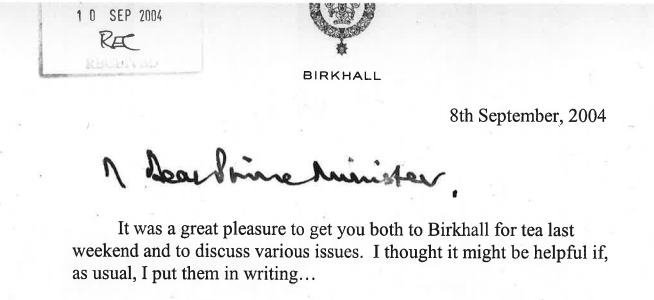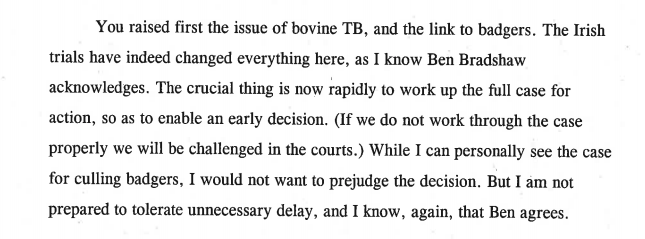Dozens of private letters written by Prince Charles to government ministers have been released under the Freedom of Information Act.

The 27 letters, which date from September 2004 to March 2005, were released following a decade-long campaign by The Guardian. Multiple governments attempted to block the release of the letters, prompting a lengthy legal battle which cost the state around £400,000. They were informally known as the "black spider" memos, because of the prince's handwriting – even though these letters all turn out to have been typed.
Charles has long been known to take an active interest in many aspects of government, regularly writing letters to ministers. However, this is the first time they have been made public, and the law has since been altered to ensure future correspondence between the future king and government ministers is protected from Freedom of Information Act requests.
A spokesperson for Prince Charles complained about the decision to publish the correspondence: "The Prince of Wales believes, as have successive Governments, that he should have a right to communicate privately. The publication of private letters can only inhibit his ability to express the concerns and suggestions which have been put to him in the course of his travels and meetings."
This is what we learned from the letters that the government fought for a decade to hide:
Prince Charles began a letter to Tony Blair in 2004 like this.

While this is how Blair replied.

The prince wrote to the prime minister to complain that "significant pressure" on defence funding during the Iraq war was endangering British troops.

Blair replied, insisting that the military would receive more funding for helicopters.

The prince also wrote to Blair to call for less regulation of herbal medicine.

The PM replied, saying he had consulted with the prince's "contacts on herbal medicines" and agreed that the "implementation as it is currently planned is crazy".

Charles wrote at length to Blair about the threat to traditional agriculture.

He also really hated the "badger lobby" and wanted a cull of the animals to restrict the spread of disease among cows.

Blair replied, saying he was quite up for a badger cull.

The prince also wrote to the then education secretary, Ruth Kelly, to lobby for more summer schools for teachers.

Kelly politely turned down his request.

Charles Clarke, the home secretary, also responded to an unpublished letter from the prince, apparently complaining that schoolchildren did not have a healthy diet.

As a result, we know Clarke signed letters to the prince as his "most humble and obedient servant".

But mainly Charles just wanted ministers to support good-quality buildings, as shown by this letter to the Northern Ireland secretary.

Charles lobbied culture secretary Tessa Jowell to protect a historic lavatory block at Smithfield Market in London. Jowell decided she would list the buildings.

He also pleaded with Jowell to find funding for historic huts in Antarctica.

The letters do show a certain self-awareness. Charles is concerned about the risks of the correspondence being obtained under the FOI Act.

Charles was also very concerned about being perceived as a "complete bore".

But perhaps most intriguingly, he was really concerned about what the government was doing to help the Patagonian toothfish.


